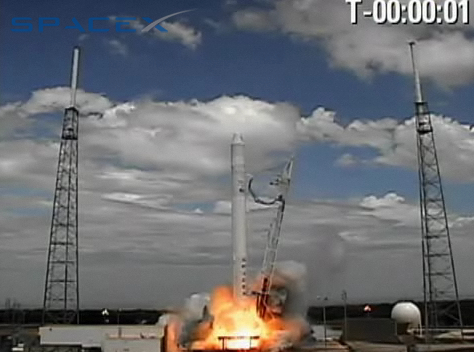Science News
Falcon 9 Lift-off

This afternoon, Falcon 9 had a successful launch. And why is that such big news?
Though the 180-foot rocket launched from Cape Canaveral, where many NASA spacecraft lift-off, it was done so by a private company, Space Exploration Technologies Corporation, or SpaceX. (SpaceX was found by internet entrepreneur Elon Musk, who also runs Tesla Motors.)
With the space shuttle program coming to an end within the year, commercial rockets like these may become essentials tools for getting cargo, and astronauts, to the International Space Station and beyond.
NASA Administrator Charles Bolden had this official statement after the launch:
Space X's accomplishment is an important milestone in the commercial transportation effort and puts the company a step closer to providing cargo services to the International Space Station.
Not only was the launch successful, but the separation of the Dragon spacecraft capsule also went off without a hitch. (You can view video of the lift-off and separation here.)
Later this year, SpaceX will launch a second Falcon 9 rocket to prove to NASA it can handle cargo.
According to NPR,
SpaceX has a contract with NASA to use the Falcon 9 and its "Dragon" capsule to carry cargo to and from the International Space Station, starting next year. And SpaceX has designed the Dragon spacecraft so that it could potentially take up NASA astronauts.
President Obama has been pushing the idea of this kind of space taxi for hire.
Reuters says that NASA will now focus on research and technology development while SpaceX and other private companies do the heavy lifting (literally).
SpaceX is selling its Falcon 9 rockets, which can carry 12 tonnes to an orbit about 225 miles above Earth, for about $50 million -- less than half what is typically charged for rides on similar U.S. rockets.
And Nature’s blog, The Great Beyond, sums it up this way:
This bodes well for NASA science mission managers, who desperately need a new, cheap supplier of medium-sized rockets. It also means that the radical shift afoot within NASA's human spaceflight programme, which is trying to dump expensive government-owned vehicles in favor of these so-called commercial rockets, now has perhaps slightly more credibility with a skeptical Congress.
Success, saving money and big, big news!